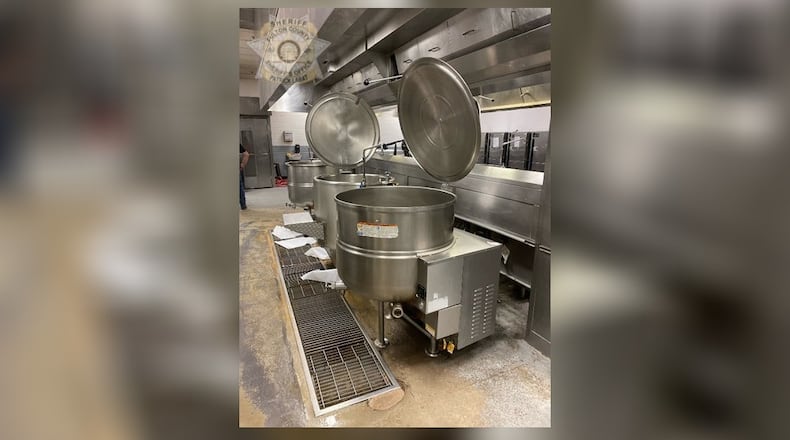More than 24 hours after a half-dozen contracted employees were treated following a carbon monoxide leak at the Fulton County Jail, officials say recently implemented sensors alerted staff to high levels of the dangerous gas Wednesday morning, causing 15 kitchen workers to be evaluated. Two others took themselves to the hospital.
The original leak had been traced Monday night to one of the eight kettles inside the kitchen, which was shut down by the Atlanta Fire Rescue Department, according to Fulton Sheriff Pat Labat. On Wednesday, after staff again experienced symptoms related to carbon monoxide, firefighters discovered a second kettle was responsible for the high levels, causing the kitchen to be shuttered again, the sheriff’s office said.
All of the employees evaluated over the past two days are expected to be fine, including three people who took themselves to the hospital and five others treated at the scene Tuesday, department spokeswoman Natalie Ammons told The Atlanta Journal-Constitution.
“For the second day in a row, AFRD and EMS have been called and the Fulton County Jail has had to cease kitchen operations due to problems related to the gas line,” Labat wrote in a statement Wednesday. “In the past three years, over 1,000 work orders have been submitted for issues with the kitchen alone. The air conditioning has been out since April and temperature readings have reached the 90s.”
In addition to carbon monoxide, an odorless and colorless gas, officials said natural gas was also leaking from a supply line to a stovetop in the kitchen. Atlanta Gas Light crews were on scene to determine if a faulty regulator to the gas line that leads to the building would need to be replaced or repaired.
Officials said there was no timetable as to when the kitchen would be operational. A private contractor had confirmed the high levels of carbon monoxide Monday before the sensors were added. At least four working kettles are needed to provide up to 11,000 meals a day, depending on the inmate population.
Credit: AP
Credit: AP
With the gas off, carbon monoxide levels were going down and cold meals will be served to inmates “until further notice,” Ammons said. Officials noted there was some food prepared in case of an emergency and a food vendor is going to serve staff meals. The leak did not appear to impact other areas of the jail, whose conditions are under investigation by the U.S. Department of Justice.
On Friday, Labat called plans to renovate the jail instead of building a new $1.7 billion facility “shortsighted” and believed the DOJ probe would recommend a new one. Two days earlier, a majority of the Fulton Commission voted to issue a request for a proposal to study a $300 million renovation of the existing jail, instead of building a new facility.
“When we are responsible for feeding thousands of residents a day, our inability to continue work in our kitchen for a 24/7 operation is problematic,” Labat said. “Until we get a replacement facility, problems in the kitchen and rest of the building will continue to cripple our capability to properly serve our resident population and overall keep our residents and staff safe.”
In the U.S., at least 400 people die each year and more than 14,000 others are hospitalized from unintentional carbon monoxide (CO) poisoning not linked to fires, according to the Atlanta-based Centers for Disease Control and Prevention. In August 2020, a woman was found dead and six other people were hospitalized after being exposed to high levels of carbon monoxide inside interconnected townhomes in Milton. Nearly two years earlier, a 25-year-old Roswell man died of carbon monoxide poisoning after a car was left running in a garage, causing the gas to fill his house.
According to the agency, carbon monoxide is found in fumes that are produced anytime fuel is burned in “cars or trucks, small engines, stoves, lanterns, grills, fireplaces, gas ranges or furnaces.” Common symptoms are described as flu-like and can include headache, dizziness, weakness, upset stomach, vomiting and confusion.
“If you breathe in a lot of CO, it can make you pass out or kill you. People who are sleeping or drunk can die from CO poisoning before they have symptoms,” the CDC warned.
— Please return to The Atlanta Journal-Constitution for updates.
About the Author
Keep Reading
The Latest
Featured



